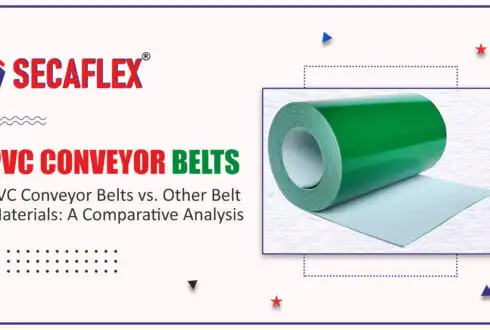- + 91-9167662789
- care@dktee.com

July 18, 2023

Conveyor belts are a critical component of material handling systems, facilitating the efficient transportation of goods and materials in various industries. Selecting the appropriate belt material is essential when choosing the right conveyor belt. Among the best belt materials available, PVC Conveyor Belts have gained significant popularity.
PVC Conveyor Belts: Characteristics and Advantages
PVC Polyvinyl Chloride) conveyor belts offer a range of benefits that make them suitable for a wide range of applications:
- Cost-Effective: Known for their affordability. They provide a cost-effective solution for many industries, especially those with medium-duty applications that require a balance between performance and budget.
- Versatility: Highly versatile and can handle various materials and loads. They are available in different configurations, including smooth, rough top, and cleated options, making them suitable for applications in industries such as manufacturing, food processing, and packaging.
- Durability: PVC conveyor belts offered by the best Polyvinyl Chloride) Manufacturers in India can withstand harsh operating conditions, making them suitable for heavy-duty applications in industries like mining and construction.
- Easy Maintenance: Relatively easy to clean and maintain. They are resistant to staining and can be cleaned with mild detergents and water; ensuring hygienic standards are met in industries such as food processing and pharmaceuticals.
- Flexibility: Offer flexibility, allowing them to conform to various conveyor configurations. They can be customized to specific lengths and widths, accommodating different conveyor designs and layouts.
Other Belt Materials: A Comparative Overview
Besides PVC, several other belt materials are commonly used in conveyor systems. Let’s examine some of these materials and compare their characteristics and advantages:
- Rubber: Rubber conveyor belts are popular due to their high tensile strength and flexibility. They offer excellent resistance to impact, tear, and abrasion, making them suitable for heavy-duty applications. Rubber belts are commonly used in mining, aggregate, and bulk material handling industries.
- Polyester (EP): Polyester conveyor belts are known for their strength, stability, and low elongation properties. They have high resistance to moisture, chemicals, and heat, making them suitable for applications in industries such as cement, steel, and power generation.
- Nylon (NN): Nylon conveyor belts are characterized by their high tensile strength, impact resistance, and fatigue resistance. They are commonly used in applications requiring long-distance conveying, such as mining, ports, and logistics.
- Metal: Metal conveyor belts, typically made of stainless steel or carbon steel, offer exceptional strength, heat, and corrosion resistance. They are widely used in the automotive, electronics, and heat treatment industries.
Comparative Analysis: PVC vs. Other Belt Materials
- PU Conveyor Belt is generally more cost-effective than rubber or metal materials. PVC balances affordability and performance, making it a popular choice for industries with medium-duty applications.
- The PVC belts offer good durability and resistance to abrasion and chemicals. While rubber and metal belts may have higher resistance to wear and tear, PVC belts provide sufficient durability for many applications.
- PVC is highly flexible, allowing them to adapt to various conveyor designs and configurations. Rubber belts and specific fabric belts may offer similar flexibility, but metal belts are typically less flexible.
- PVC belts are resistant to chemicals, oils, and staining. Rubber belts resist impact and abrasion, while metal belts offer exceptional heat and corrosion resistance.
- Different belt materials have specific strengths and are better suited for particular applications. PVC belts are versatile and can handle a wide range of materials, while rubber belts are commonly used in heavy-duty applications; metal belts are ideal for high-temperature or corrosive environments.
Conclusion
PVC Conveyor Belts offer a cost-effective and versatile solution for medium-duty applications in various industries. While other belt materials like rubber, polyester, nylon, and metal have unique advantages, PVC belts provide a balanced combination of affordability, durability, flexibility, and resistance. By conducting a comparative analysis of the different belt materials, businesses can make informed decisions about the most suitable conveyor belt material for their specific needs, ensuring efficient and reliable material handling.
If you are looking for a leading PVC Conveyor Belts Suppliers in India, then DKT Engineering Enterprises is a reliable source, known for offering quality industrial belt.

DKT Engineering Enterprises
DKT Engineering Enterprises has vast experience in manufacturing conveyor belts in India. We are providing high quality products to our clients Since 2010.
